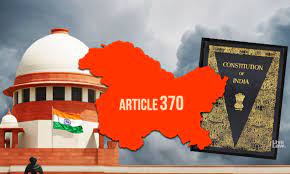The Supreme Court today said the nullification of Article 370 of the Constitution could be challenged only on the ground of constitutional violations, and not on the intention or wisdom of the Centre or Parliament in taking the decision.
“You want judicial review to assess the intention of the government to abrogate Article 370? Judicial review will be for the constitutional violation… There is no doubt that if there is such a violation, this court will intervene. But are you asking us to judicially review the wisdom underlying the decision to abrogate Article 370?” a five-judge Constitution Bench led by CJI DY Chandrachud asked senior counsel Dushyant Dave, who represented one of the petitioners challenging nullification of the controversial provision.
Dave said the nullification was a political move promised by the BJP in its manifesto.
“The abrogation is a complete fraud on the Constitution. In the BJP manifesto, they had promised abrogation, and this court had ruled that these manifestos cannot be against the constitutional scheme and spirit. Now because you have a majority in Parliament, you have done this and it is all because you told people to vote for you and you will abrogate it. This shows power exercised for colourable considerations. The President is not a rubber stamp; the majority does not speak, it’s not a constituent power,” Dave argued.
As Dave said Article 370 could not have been repealed using Article 370(3), Justice Kaul responded, “It exists in the Constitution… there is no repeal. Now as it stands, all provisions of the Constitution will apply to J&K.”
The Bench said the argument that Article 370 had become permanent after the Jammu and Kashmir Constituent Assembly ceased to exist in 1957 was contradicted by the practice of issuing Constitution Orders modifying the constitution in relation to J&K. As Dave termed the Constitution Orders as a “wrong practice”, the CJI said, “We are talking of practice of 64 years!”


